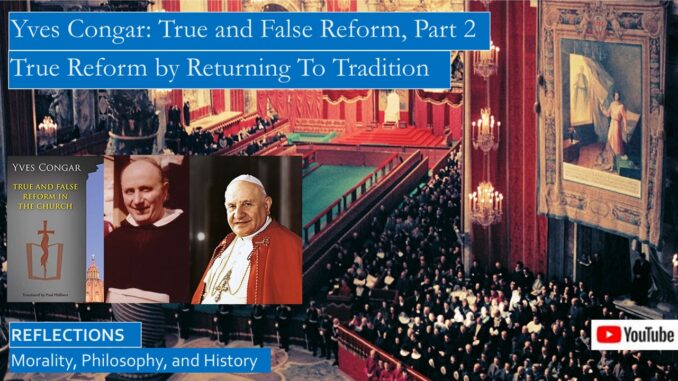
True reforms seeks to go back to the sources, the sources of our tradition, the sources of our faith, true reform recovers the truths that have been forgotten.
Yves Congar reflects: Who were the successful reformers? Who were the divisive reformers? Successful reformers are those reformers who respect the tradition of the church, whose reforms seek to return the church to its ancient traditions recently forgotten, to return to the ancient sources of the faith. These successful reformers include St Francis of Assisi, and St Thomas Aquinas, and he contrasts them with reformers who broke with the church, including Peter Waldo and Luther, while being careful to acknowledge when these divisive reformers did provide valuable spiritual and practical insights.
The first video reflected on the first part of his book on finding common ground, and reflects on the true reforms that are true to the traditions of the church. https://youtu.be/yYp7yFZqc3s
It is helpful to review an outline of what Yves Congar discusses in this second section:
Part Two. Conditions for Authentic Reform Without Schism
- Understanding the Problem.
- First Condition: The Primacy of Charity and of Pastoral Concerns. We should love our fellow Christian, and address him in charity and kindness, respecting his beliefs, although when we believe they are wrong.
- Second Condition: Remain in Communion with the Whole Church
- Third Condition: Be Patient With Delays.
- Fourth Condition: Genuine Renewal Through Tradition, and Not Through Novelties
Part 2. Conditions for Authentic Reform Without Schism, Understanding the Problem.
The first successful reformer, though we do not ordinarily think of him as a reformer, was St Francis of Assisi. Early in his ministry, he led his small band of mendicant followers to Rome, where he sought the blessing of Pope Innocent III. St Francis always insisted on working within the church, teaching more by example than exhortation, always respecting the authority of the church.
Yves Congar quotes from Lacordaire’s Life of St Dominic when he compares Peter Waldo to the two great Catholic saints of his day. Like St Francis, Peter Waldo lived a life of holy poverty, but he was condemned as a heretic when he broke away from the Catholic Church. “How small is the difference between the way great men think and the way public nuisances think. If Peter Waldo had more virtue and genius, he might have been a St Francis or St Dominic. But he gave in to a temptation that has spoiled people of great intelligence throughout history. He thought it was impossible to save the church through the church.”
Yves Congar sees in the early Luther “an insight whose richness includes some ambiguity, and that this ambiguity exists not only with Luther before his break with the church but also to some extent with Augustine and the Augustinian tradition.” The break with the church was forced at the Diet of Worms, where the theologians refused to debate with Luther, they simply stacked his books on a table and gave him a choice, RECANT, or be placed under a death sentence. After thinking about it overnight, Luther delivered his famous short speech, “Here I stand, I can do no other. God help me.”
Luther, and especially Calvin and succeeding Protestant reformers, criticized the ornate rituals of the mass and the sacraments as being merely works that do not lead to salvation. This is certainly a spiritual danger, but as Yves Congar notes, “it was a tragic excess on Luther’s part, from which Protestantism has never totally escaped, to consider every ‘form’ as an expression of a ‘letter’ that inevitably betrays the spirit,” referring to 2 Cor 3:6: “For the letter (of the law) kills, but the Spirit gives life.”
Yves Congar warns, “the possibilities for self-criticism in the church practically dried up following the excessive criticisms of Luther and the attacks of Voltaire,” the French philosopher who paved the way for the French Revolution.[1] I was brought up and confirmed a Lutheran, and in my youth, I decided to read Luther’s works in the original rather than in friendly summaries. I was appalled at how Luther constantly called the Pope names, sometimes vulgar names. The polemic battles were so heated that the Catholic Church was forced to dig a moat around the church and fill it with alligators, and this defensive attitude persisted until the Second Vatican Council.
Another theologian who was also influential at Vatican II and who reminds me of Martin Luther was Hans Kung. Like Luther, Hans Kung was brilliant, and was an amazing prolific writer who wrote multiple thousand-page books of captivating and engaging prose, but his brilliance got the better of him, he got the sense that he alone possessed the vision to guide the church into a new age. What was worse was he insisted on holding press conferences where he, in essence, railed at the church for not listening to him. Even his friendship with the future Pope Benedict XVI could not save him.
Part 2. FIRST Condition: The Primacy of Charity and of Pastoral Concerns
Yves Congar provided the narrative for the calling of the Second Vatican Council, this would not be a condemning council, quick to issue anathemas against the enemies of the church; rather, this would be a pastoral council, the Catholic Church reaching out to the world with charity, compassion, and brotherhood. As Yves Congar notes, “Successful reforms are motivated by pastoral concerns,” reform is not an intellectual endeavor, but seeks to enrich the spiritual and moral life of all the faithful.
This can be seen in the reforms after the Council of Trent. These reforms were both theological and pastoral; first, there was an “enormous effort addressed to apologetics and theology to counter the Reformation, and there was a great pastoral effort to encourage religious renewal aiming at holiness,” these pastoral efforts continued, becoming part of the Catholic tradition. Yves Congar admits that Protestants also had a pastoral concern for their flock, “everything great and fertile” from the theology of Karl Barth derived from his simple question as a young pastor, “What should I preach and how should I preach to the faithful on Sunday?”
Yves Congar recalls a rule of reform set down by Mohler, “The Christian shouldn’t try to perfect Christianity, but rather desire to perfect himself in Christianity.” Yves Congar teaches us, “For the reformer who wants to remain in harmony with the Catholic communion, the church has to remain a given, not only intellectually but also existentially. The reformer can never step outside the church to judge it, but can only remain committed within its existing conditions, especially if there is need for some dimension of reform.”
Yves Congar quotes Pope Pius XI, the pope who signed the Lateran Treaty with Mussolini creating the Vatican City, serving until the eve of World War II, “Every true and lasting reform had its point of departure in holiness, by those who were inflamed and impelled by the love of God and neighbor. Generous, ready to listen to every call from God and to respond immediately within themselves, and yet sure of themselves because of their vocation, they grew to become true lights and sources of renewal for their time. By contrast, where the zeal of the reformer did not arise from personal purity, but was the expression and the outburst of passion, it was a source of disturbance rather than illumination, destructive rather than instructive, and more than once the source of distortions more damaging than the evils to which they claim to remedy.”[2]
Part 2. Second Condition: Remain in Communion with the Whole Church
Yves Congar opens this chapter with a quote from Mohler, “no one can live a Christian life, or be at home in their religion, without the influence of the community of the faithful enlightened by the Holy Spirit.” The apostles only received the Holy Spirit when they were “gathered in the same place, with one heart, forming a single gathering of brothers.” Reformers cannot reform alone.
Yves Congar teaches us, “The scholar or reformer who, while affirming a particular aspect of truth, clings to the desire not to deny other aspects and to remain in communion with all the others in the church, remains Catholic. By contrast, the scholar or reformer who insists on ‘being himself,’” “risks falling into schism. When St Ignatius of Loyola published his Exercises, which were a novelty at the time, he appended to them ‘Rules of Orthodoxy,’ which testified to his concern to keep his initiative in communion with the church.”
Yves Congar teaches us, “Communion will always mean not something servile or mechanical, but a living relation to the apostolic authority given by the Lord to structure his church, both at the local and the universal level. By this very fact, communion means a kind of submission that is neither servile nor mechanical, but enthusiastic, loving, and simple, like the acquiescence of children. The Catholic Church has always seen pride and self-centeredness in the perpetrators of schism or heresy.”
Yves Congar observes, “If people were always required to conform themselves to the actual state of theological thinking, church practice, spirituality, and administration of the church, there would never be adaptation, reform, or progress. We would never have had religious orders, frequent Communion, devotion to the Sacred Heart, the Summa Theologiae, Catholic Action, missionary renewal,” “or any other moments of church renewal that fill history.” “These innovations are taken for granted today, they are no longer daring, they have become a sacred tradition.”
Yves Congar laments, “it is so tragic that so many great minds believ they could be faithful to the truth only by clinging to their own interpretation, rather than to interpretation of the church.”[3]
Part 2. Third Condition: Be Patient With Delays
Reformers are by nature impatient, but the impatience of reformers endangers their reforms. Yves Congar agrees, “Reformers always have a tendency not only to initiate things but also to rush their development. They not only want to clean up the field; they want to free it of every weed. The Gospel parable of the wheat and the weeds, however, exhorts us to respect the period of waiting until the harvest for the growth of the seeds. It exhorts us not to anticipate the harvest with impatient efforts to clean things up, lest ‘in gathering the weeds you would uproot the wheat along with the weeds.’”
A saying from Christian Africa was that “Christ didn’t say, ‘I am custom,’ but ‘I am truth.’ No matter how old or widespread a custom may be, it has to give way to truth.”
Yves Congar is both sympathetic and critical towards Luther, he mention him often. But his insight here provides lessons for many. “Unquestionably, Luther was a theological genius, but he allowed himself to be guided and finally ruined by polemic,” like calling the Pope names.
“Luther allowed himself to be pushed into becoming the founder of a church and into rethinking the meaning of Christianity all by himself. The fatal logic of his position was this: he had to reinvent Christianity not with the whole church and within it, but against the church and against the integrity of its tradition.” But we must admit his hand was somewhat forced by the heavy-handedness of the Catholic leaders of his time.
Yves Congar observes, “Those responsible for the administration of an organization don’t like things to be called into question. Novelty always looks dangerous to them and reformers inopportune, indeed troublesome. In fact, the impatience of reformers often enough risks spoiling everything. The impatience of reformers doesn’t take account of the delays needed for transformation to take place,” in fact, impatience could cause the “organization to self-destruct, since the best sometimes is the enemy of the good. The church is decidedly in favor of the good, and only welcomes the better if it builds up more than it risks breaking down.”[4]
An excellent secular example of the need for reformers to show patience is when the Supreme Court issued the order to desegregate schools in 1954, Brown v Board of Education, when it declared that this decision should be implemented “with all deliberate speed.” They knew it would take years of effort and litigation to persuade the Deep South segregationists to allow black children into the public schools, they also knew that the more they rushed the reform, the greater the violence.[5]
Part 2. Fourth Condition: Genuine Renewal Through Tradition, and Not Through Novelties
Yves Congar is not a radical reformer, his idea of reform is to return to the sources, return to tradition, return to the core of the faith as expressed in the early church. Yves Congar states that there are only two types of renewal:
- Reforms formed in the minds of men, a new novel ideology that is novel and schismatic, a novelty that can bring disunity to the church.
- Reforms formed by men reflecting on the mind of God, reforms that seek to renew the core of the Christian faith, “a genuine renewal that is a reform in and of the church, a reform without schism,” where the “reformer works within the church.” To bring about genuine reform without schism, “we must study Catholic Tradition and not turn to masters foreign to the Tradition.”
“Catholicity is like the branches of a great tree receiving life from the unity of its trunk; catholicity is not like a mound of cut branches scattered in a pile around the trunk of the tree.”
One of Yves Congar’s other groundbreaking works published in 1960 that influenced the Second Vatican Council was his book, Meaning of Tradition.
Tradition is alive, Yves Congar emphasizes that “tradition does not mean ‘routine,’ no more than it means something ‘in the past.’ Of course, tradition has an aspect of the past; it is the treasury of texts and realities from the church’s past. But tradition is also much more than that. Tradition is the continuity of development from the initial gift of the church,” “Scripture, the thoughts of the Fathers, the faith, the liturgy, or the prayer of the whole church,” the church fathers and theologians over the ages, “the development of piety and doctrine, and finally, leading to the thinking and development of the actual church. That means today’s church is perpetually seeking to express its faith in praise and contemplation,” “all under the guidance of the magisterium.”
Genuine reform, “returning to tradition,” “means earnestly studying the very sources of Catholicism.” “To return to principles, to ‘go back to the sources,’ means to rethink our current situation in the light and spirit of everything that the integrity of tradition teaches us about the meaning of the church.”
Reform is an intellectual effort, as we genuinely reflect on the core teachings of the church, which takes study, but it is also much more than an intellectual effort. Yves Congar teaches us, “Reform is a renewal of life.” Without this personal renewal leading to living a godly life, a reform effort, even when it is focused on “an intellectual return to the sources and a recentering, will not possess a spirit of evangelization or the fullness of authenticity and efficacy.”
Yves Congar provides an example of a reformer who successfully brought modern ideas into the church according to these guidelines. St Thomas Aquinas, who was modern in his time, and controversial, “introduced Aristotle into theology without violating either Catholic dogma or the spirit of evangelization,” because he profoundly understood and respected Catholic tradition. Yves Congar also has an extended discussion of the successes and shortcomings when Catholicism encounters Modernism in recent times.
Successful reforms bring to life aspects of our long Christian tradition that have been forgotten or neglected. Yves Congar teaches us, “a genuine development of tradition with all that implies, a return to deep sources, discernment and purification, a balanced and fully spiritual communion, this transcends the efforts of one person or team, it must be the work of a generation.” Reformers must inspire others to persevere; otherwise, there is no genuine reform.
THE CHURCH NEEDS TO LIVE IN CONTACT WITH ITS DEEPEST TRADITION
Yves Congar endured a decade where the top Vatican II officials tried to silence him, when he was forced into physical and spiritual exile and quietude, but yet he neither left the church, nor did he call press conferences to protest his treatment, as Hans Kung would later do. Even during these dark times, he respected the authority of the church, showing charitable forbearance and patience. Yves Congar had been patiently enduring criticism for a few years when he reflects that “in the process of discernment and purification, by way of returning to the depth of principles, this moment of checkmate or even of condemnation” by church authorities “plays an important role that can be positive, despite appearances.” These church authorities have an immense flock of souls they must guard, they are properly not eager to welcome criticism and all calls for reform.
But the church must not plug its ears for calls to reform, although she is justified by her initial reticence. Yves Congar teaches us that this initial refusal of “novelty does not reduce the church’s overwhelming duty to keep itself deeply in contact with its tradition. This means contact not only on the surface and according to the letter of the law but also in depth and according to the reality of the progressive change that gives this tradition its full meaning.”
The Pius popes were both resistant to Modernism, but in their own ways also advanced reforms that helped prepare the church for the Second Vatican Council. Pope Gregory XVI, who died in 1846, famously forbid the building of trains in the Vatican, saying “road of iron, rod of hell,” but construction of a railroad connecting Vatican City to the rest of Italy was made possible by the 1929 Lateran Treaty signed by Pope Pius XI and Mussolini.
Pope Leo XIII had issued the progressive Rerum Novarum encyclical on the rights of the laborer under capitalism, strengthening the social justice doctrine. He was succeeded by the reactionary Pope Pius X, who condemned Modernism, restricting how scholars could interpret Scripture, and mandating that theologians and Catholic professors could only teach the “safe” doctrines of St Thomas Aquinas. But he also reformed the church when he encouraged the faithful to partake of the Eucharist more frequently, even weekly, and lowered the age of first communion from twelve to seven.
Yves Congar says this about Pope Pius X, “By putting conservative piety back at the center of Christian life, resuscitating the church once again on the soil of primitive dogma and insisting on this for the interior life, the Pope is actually clearing the way for a future assimilation of useful aspects of modern culture.”[6]
REHABILITATING YVES CONGAR AND HENRI DE LUBAC
Yves Congar did not show any rancor after he and Henri de Lubac were rehabilitated and asked to be consultors to the Preparatory Commission to Vatican II. Initially they were somewhat ignored by the reactionary chair of the commission, Cardinal Ottaviani, and wondered whether they were wasting their time. They did not realize that they were there at the direct intervention of Pope John XXIII; wisely, nobody told them this was the case, and wisely the pope did not interfere with the workings of the commission.
Yves Congar remembers talking to the chairman of the Preparatory Commission:
“I waited a long time to talk to Cardinal Ottaviani for the first time. The cardinal said at once that my report had provoked criticism: ‘Why could I not keep in line?’ He said I was intelligent and learned, and my book on Reform has some very fine pages,” and other pages that were not so much. Ottaviani asked, “Why must one always point out the weaknesses of the Church? By doing so, one undermines confidence in the hierarchy and the Magisterium.”
Although Yves Congar was respectful, he held his ground, defending his views. Yves Congar responded that “he had no intention of undermining respect in the hierarchy, but that the Church ought to at least think about herself: if she were giving herself completely to the service of the Gospel, all authority would flow to her.”
The cardinal responded, “the bishops, the priests, the professors in the seminaries, do nothing but serve.”
Yves Congar said that “he had noticed and deplored a breach between the theology one expresses and the Christian people.” The church is not only ceremony, “The church is FOR THE PEOPLE.”
The cardinal responded that “it was a question of pastoral care,” then he said something about catechesis that Congar could not follow, and Congar remembers “that the conversation left me somewhat dismayed.” Everything that Cardinal Ottaviani said was reaffirming what Yves Congar has said in this section of the book, but the cardinal was accusing him of not believing it, or maybe the accusation was that he did not say it.[7]
What makes this exchange so poignant was that Cardinal Ottaviani was likely involved in the persecution of progressive reformers like Congar for close to a decade. Nearly all the leading theologians at the Council had been under interdict. John O’Malley in his reflections on the sessions of Vatican II tells how the bishops humbled Cardinal Ottaviani in the first session, refusing to rubber-stamp the often reactionary first drafts of the commission, and eagerly listened to the lectures by Congar and Lubac and other progressive theologians, so Ottaviani was compelled to be the one showing humility and deference.
In our next blog/video, we will reflect on Yves Congar’s concluding remarks in his final section, and then we will reflect on Pope John XXIII’s speech opening the Second Vatican Council, and the themes it shares with Congar’s book, True and False Reform.
DISCUSSION OF THE SOURCES
We found True and False Reform to be very readable, but you need some patience and dedication, Yves Congar was not writing for a mass audience, but was writing for fellow priests and academics. If you were a scholar wanting to precisely assess how this ground-breaking book influenced the Second Vatican Council, you would want to examine the first edition of this book published in 1950, comparing it to the second edition printed in 1967, which we used for this video.
We found the discussion between Yves Congar and Cardinal Ottaviani in the published diary kept by Yves Congar during the council, which documents his perspective of the evolution of the views in the Council.
We also have a book review video on our sources for our videos on the history and decrees of Vatican II.
[1] Yves Congar, True and False Reform, translated by Paul Philiobert (Collegeville, Minnesota: Liturgical Press, 2011, 1968), Part 2, Introduction, pp. 199-211 and https://www.christianitytoday.com/history/2008/august/what-luther-said.html.
[2] Yves Congar, True and False Reform, Part 2, First Condition, pp. 215-223.
[3] Yves Congar, True and False Reform, Part 2, Second Condition, pp. 229-264.
[4] Yves Congar, True and False Reform, Part 2, Third Condition, pp. 264-289.
[5] https://en.wikipedia.org/wiki/Brown_v._Board_of_Education
[6] Yves Congar, True and False Reform, Part 2, Fourth Condition, pp. 291-307 and https://en.wikipedia.org/wiki/Pope_Pius_X and https://en.wikipedia.org/wiki/Rail_transport_in_Vatican_City
[7] Yves Congar, My Journal of the Council, translated by Mary John Ronayne, Mary Cecily Boulding, and Denis Minns (Collegeville, MN: Michael Glazier Book, Liturgical Press, 2012, in French, 1966), diary entry for November 15, 1960, pp. 30-31.

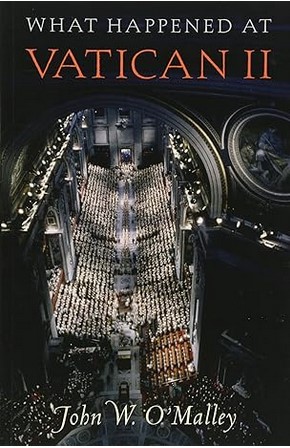
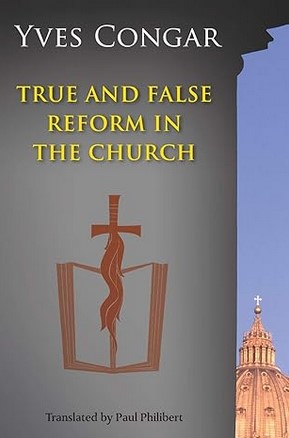
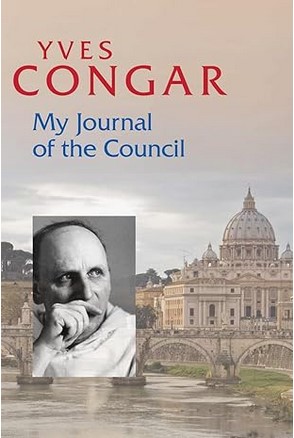
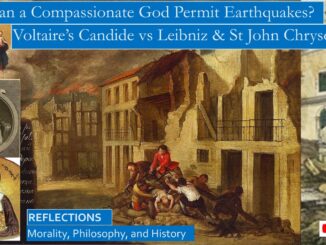
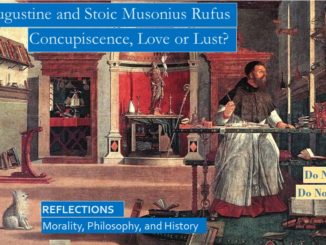
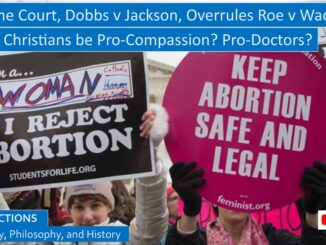
Be the first to comment